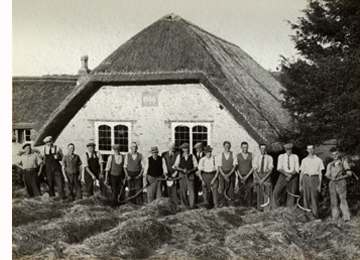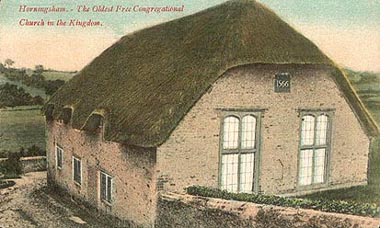|
The Congregational Church known as the Old Meeting House was built in 1556. It was used by the Scotsmen employed by Sir John Thynne to help build Longleat House. The claim that this is the oldest Free Church in England is presently unsubstantiated but it is believed to be the oldest Independent Chapel still in use for worship in England.
 This is an extract from 'The Story of England's
Oldest Free Church'. This is an extract from 'The Story of England's
Oldest Free Church'.
"The
second outstanding event was the tri-centenary of the church.
It proved to be a notable occasion. Arrangements were made
for a Thanksgiving Service in the afternoon and a Commemoration
Service in the evening of 31st July 1866. Psalms and Hymns
appropriate to the occasion were sung, of which two or three
may have been used by the founders of the Church in 1566.
The famous Old Hundredth Psalm and Tune, first of all printed
in 1566, the twenty third Psalm by Sternhold 1549 and the
hymn prefixed to the English Bible at Geneva. 1560. Other
hymns sung were,‘To thee in ages past’, ‘Lord while for
all mankind we pray’, ’Our Fathers were high minded men’
and Bishop Ken’s ’Evening Hymn’ composed as tradition affirms,
at Heavens Gate about 1697.
At
the afternoon service the Pastor presided and announced
the hymns. Prayers were offered and Lessons of Scripture
were read by the Rev. T. Mann of Trowbridge, the Rev E.
Edwards of Frome and the Rev. A Bisenti of Stalibridge.
The Rev. H Mayo Gunn of Warminster gave a paper on the “History
of the oldest Free Church in England.” Several, including
Charles Jupe Esq. of Mere and H.O. Wills of Bristol expressed
warm appreciation of this and suggested that it be printed.
The old Chapel could not contain all who came. Tea was served
to over 400 in the schoolroom."
Source:
The story of England's oldest free church by the Rev. Albert E. Banton.
Below is an extract from the Tricentenary Memorial.
"The
names of subsequent Ministers will be easily recalled, as
the Rev. A. Bisenti, who moved to Stalbridge in 1833. The
Rev. John Armitage, whose three years of office was abruptly
closed by illness, is still recollected with much esteem,
and in 1834 he undertook the judicious task of collecting
and recording with much care the traditions remembered by
old people, and the names of old members, amongst whom those
of Barber and Garrett are entered, as well as Trollope,
Chapman, and Thorne, and several others.
 After four
Ministers had remained a brief period, the Rev. William
Gething was chosen by the Church to be their pastor in 1848,
and this office he held with persevering devotedness until
his death, 1858, when he was interred in the graveyard at
the end of the Chapel. The Rev. W.B. Homewood’s work
was earnest and hopeful, but was soon cut short by premature
decline. The present Minister, the Rev, J. Pearce
Mansfield, commenced his duties in 1861 and amid inevitable
difficulties has had much encouragement in “times of refreshing
from the presence of the Lord,” in the co-operation of some
earnest workers in the Sunday School, as well as in the
valuable Week-day School for educating the young in sound
scriptural knowledge; and in the spirit of prayer, with which
some praying members implore a continuance of their heavenly
Father’s benediction on his house, so long favoured and
preserved, some pleasing and striking instances of Divine
grace changing the heart and life, show that still “The
Lord adds to the church such as should be saved; and, as
“we believe in the communion of Saints,” we pray that long
may “such as are being saved,” and only such, be added to
the church here. To render any aid to him and his
Church in preparing for this occasion has been a real pleasure
to me. After four
Ministers had remained a brief period, the Rev. William
Gething was chosen by the Church to be their pastor in 1848,
and this office he held with persevering devotedness until
his death, 1858, when he was interred in the graveyard at
the end of the Chapel. The Rev. W.B. Homewood’s work
was earnest and hopeful, but was soon cut short by premature
decline. The present Minister, the Rev, J. Pearce
Mansfield, commenced his duties in 1861 and amid inevitable
difficulties has had much encouragement in “times of refreshing
from the presence of the Lord,” in the co-operation of some
earnest workers in the Sunday School, as well as in the
valuable Week-day School for educating the young in sound
scriptural knowledge; and in the spirit of prayer, with which
some praying members implore a continuance of their heavenly
Father’s benediction on his house, so long favoured and
preserved, some pleasing and striking instances of Divine
grace changing the heart and life, show that still “The
Lord adds to the church such as should be saved; and, as
“we believe in the communion of Saints,” we pray that long
may “such as are being saved,” and only such, be added to
the church here. To render any aid to him and his
Church in preparing for this occasion has been a real pleasure
to me.
In
anticipation of this interesting and memorable year in its
history, a great improvement has been made in a fitting
preparation of the oldest Free Church in England for the
celebration of its Tricentenary. First of all a new
house for the Minister was erected by the help of a generous
friend, Mr Charles Jupe, who highly values the Lord’s work
in our villages and the teaching of the Gospel in its simple
saving truths among our rural population. Then when
there was provided a commodious manse, as the Scotch workmen
would have called it"……ends.
Scource:
Henry
Mayo Gunn Tricentenary Memorial read at Horningsham,
Wilts 31st July 1866.
|